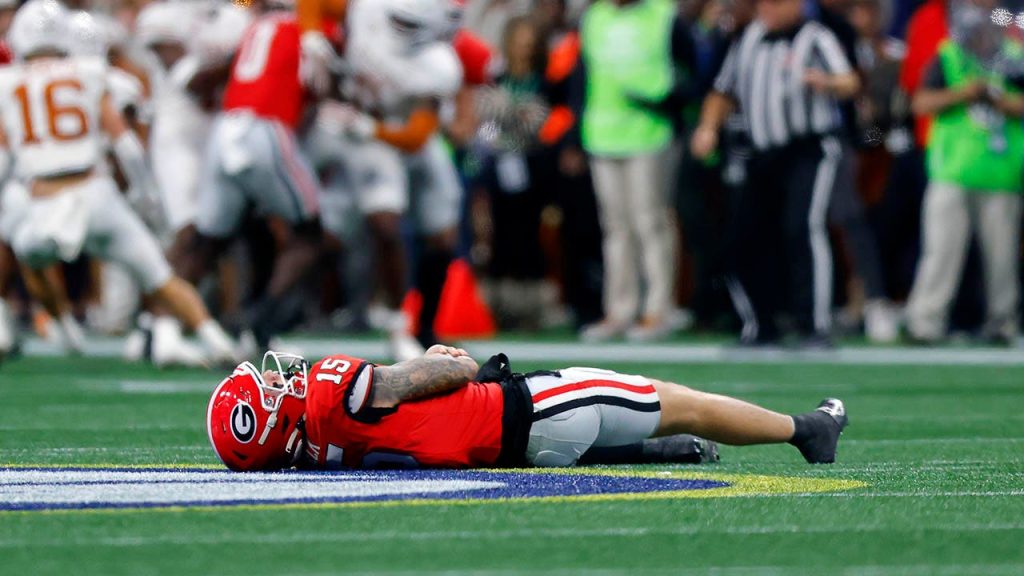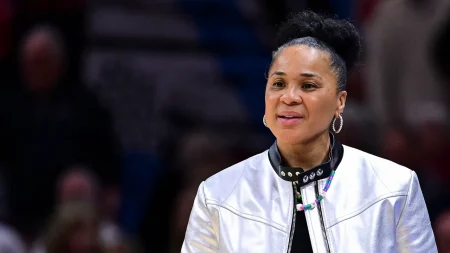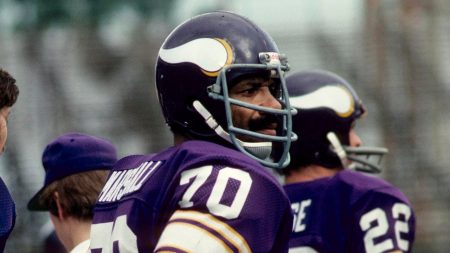Carson Beck’s unfortunate hand injury during the SEC Championship Game against Texas casts a shadow over Georgia’s aspirations and raises concerns about his future NFL prospects. With merely one second remaining in the first half, Beck, attempting a deep throw to seize the lead, suffered a jarring hit to his throwing arm. The impact was visibly forceful, causing his arm to abruptly halt mid-motion. While he managed to leave the field under his own power, the evident discomfort and subsequent confirmation of his inability to return signaled the severity of the injury. This unexpected turn of events not only impacted the game’s outcome but also adds an element of uncertainty to Beck’s pre-draft preparations.
The injury, initially downplayed by coach Kirby Smart as potentially minor, ultimately sidelined Beck for the remainder of the game, forcing backup quarterback Gunner Stockton into action. Smart’s evolving assessment, from a belief that Beck could likely continue playing to the eventual confirmation of his withdrawal, highlights the unpredictable nature of such injuries. This sudden shift in quarterback responsibility placed an unexpected burden on Stockton, who was thrust into a high-stakes situation with minimal preparation. The incident also underscores the inherent risks associated with football, particularly for quarterbacks exposed to direct hits while executing throws.
Beyond the immediate implications for the game, Beck’s injury throws a wrench into Georgia’s season and potentially impacts his NFL Draft prospects. Prior to the injury, Beck was projected as an early-round selection, with scouts and analysts impressed by his arm strength, accuracy, and overall command of the offense. However, the hand injury raises questions about his long-term health and durability, factors that could significantly influence his draft stock. The timing of the injury, so close to the draft, leaves limited opportunity for Beck to showcase his recovery and allay concerns of potential long-term effects. This unfortunate setback underscores the precarious nature of a player’s draft status, where even a single injury can dramatically alter their trajectory.
The Bulldogs’ first-half performance against Texas, culminating in a mere field goal, reflects the offensive struggles they faced even before Beck’s injury. The team’s inability to generate consistent offensive momentum, coupled with Texas’ equally lackluster offensive showing, resulted in a low-scoring, defensive battle. This offensive stagnation, evident even with Beck at the helm, raises concerns about the overall efficacy of Georgia’s offensive strategy and execution. The team’s reliance on Beck’s abilities becomes even more apparent in his absence, highlighting the need for a more robust and versatile offensive approach.
The SEC Championship game carries significant weight for Georgia, representing an opportunity to secure a conference title and solidify their position in the national landscape. A loss in this game would mark their third defeat of the season, a rarity for the program in recent years. The last time Georgia suffered three losses in a single season was in 2018, emphasizing the high expectations placed upon the team. This year also marked their first loss to a team other than Alabama since 2020, when they fell to Ole Miss. These statistics underscore the significance of the SEC Championship game and the pressure on Georgia to maintain their winning tradition.
The implications of Beck’s injury extend beyond the immediate game and impact his long-term prospects, the team’s performance, and Georgia’s overall season. The uncertainty surrounding his recovery timeline, the potential impact on his draft position, and the team’s struggle to generate consistent offense all contribute to a complex and concerning situation. Georgia’s ability to overcome Beck’s absence, adapt their offensive strategy, and maintain their competitive edge will be crucial in determining the ultimate outcome of the season and Beck’s future in professional football.










